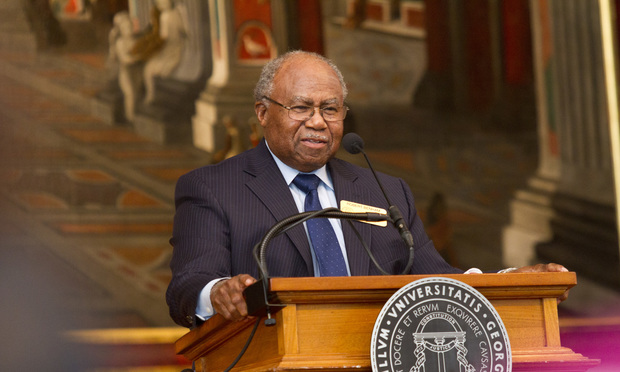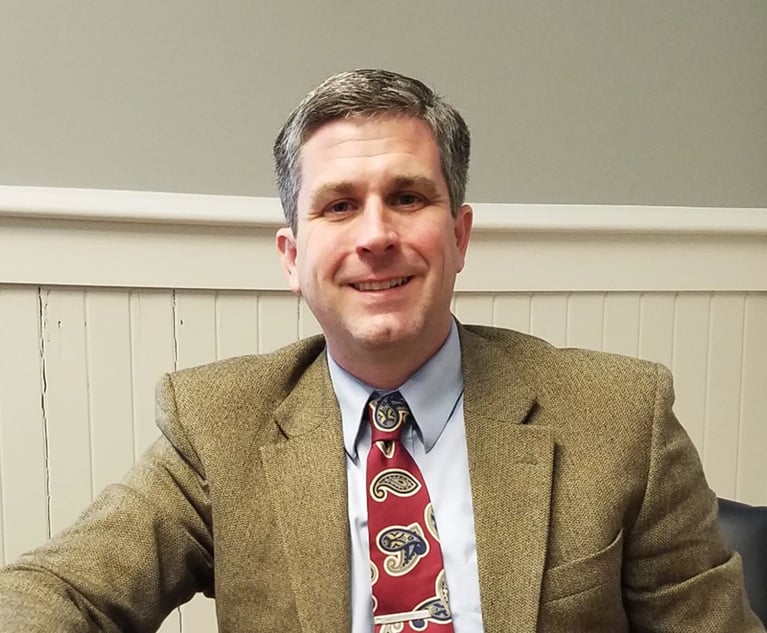'I Put on the Armor of the Law to Slay the Dragons,' Justice Benham Says at UGA Lecture
"I tell you this to tell you what lawyers do and why they do it," Benham said. "But there are certain things that the law can't handle. We can't let the evils of yesterday use up our tomorrows. As a people, we have more in common than things that separate us."
February 03, 2020 at 06:47 PM
6 minute read
 Georgia Supreme Court Justice Robert Benham gave the Holmes Hunter Signature Lecture at the University og Georgia on Monday. Photo: John Disney/ ALM
Georgia Supreme Court Justice Robert Benham gave the Holmes Hunter Signature Lecture at the University og Georgia on Monday. Photo: John Disney/ ALM
Georgia Supreme Court Justice Robert Benham captivated a crowd Monday at the University of Georgia with stories of himself as a litigator who likes a "nasty, protracted fight," and a boy breaking windows who could have gone in another direction without the benefit of forgiveness.
Benham—who plans to retire in March—used his own brand of humor mixed with poetry in the annual Holmes-Hunter lecture. The event is named for the university's first two African American graduates, the late Dr. Hamilton Holmes and journalist Charlayne Hunter-Gault. Hunter-Gault made a surprise appearance to introduce Benham at the chapel on the old North Campus. The room was packed to the balconies. The speech was bookmarked by standing ovations.
The window-breaking story was delivered two Sundays ago as a confession at the church where it happened, Benham said. He described himself with a pile of rocks, cheered on by other boys, breaking one by one every window in that church.
"When I saw the preacher coming, I ran," he said. "I ran all the way home. The preacher followed me."
He said the pastor asked his parents to speak to him alone, then confronted him about the windows.
"I don't know what you're talking about," Behnam said he replied.
The pastor answered, "I want to hug you. I've begged for new windows. The Lord saw fit to send a fool like you to get them."
After the laughter subsided, Benham made his point. He said his life could have taken a different trajectory had that pastor not been forgiving and chosen to "salvage a young man rather than punishing a young man." He said judges need to bear that notion in mind.
Benham is the longest-serving and first African American member of the Supreme Court of Georgia. After earning his bachelor's degree from Tuskegee University in 1967, Benham became the second African American to graduate from the University of Georgia School of Law in 1970. Following law school, Benham served in the U.S. Army Reserve, attaining the rank of captain. Later he returned home to Cartersville and started his law practice.
In 1983, Benham's friend from Cartersville, Joe Frank Harris, was sworn in as governor. In 1984, Harris appointed Benham to the Georgia Court of Appeals. Benham served for five years on the intermediate appellate court until Harris appointed him to the Georgia Supreme Court in 1989. Benham served as chief justice from 1995-2001, again breaking historic ground.
In 2018, UGA Law established the Benham Scholars Program to foster diversity in the legal profession.
Benham began his story in the "red clay"of the North Georgia hills growing up in Cartersville. He was the youngest of three boys and the first person in his family to be born in a hospital.
"I cost my family $28," he said. "My father said it was the biggest waste of money he ever saw."
Benham traced his bent toward justice to the brokenness he saw in his father's face when the family was turned away from a place called "Storyland" they had heard about on television—in advertisements that didn't mention the white-only policy. He said their father was silent all the way home, then went into his room and wept. "I had never seen my father cry before."
Benham said he started his own personal civil rights activism with small steps: walking into a white school's library and borrowing a book, sitting up front on a bus to Marietta, ordering food at a restaurant but insisting on picking it up at the white-only window. Eventually, he said, "I put on the armor of the law to slay the dragons."
One of his first targets as a civil litigator was a carpet mill in North Georgia he sued for employment discrimination. He said he knew if he could beat one, others would take note. He said he took on two clients suffering from AIDS when the local hospital refused to treat them. The administrator backed down after Benham threatened to sue in federal court.
"I don't know what I would have said in front of that federal judge," he said.
Benham said he sued a local skating rink for discrimination after an African American girl and her friends were turned away.
"I don't care what kind of lawyer you are, they won't skate here," he said the owner told him.
Benham said he answered, "Not only are they going to skate here, but you are going to pay me to make them skate here."
In court, Benham said the owner argued that the skating rink was really a hotel with fewer than four rooms, and thus was exempt from anti-discrimination laws.
"That was the first time I saw a federal judge laugh out loud," Benham said. He said he won his case—and his legal fees.
"I tell you this to tell you what lawyers do and why they do it," Benham said. "But there are certain things that the law can't handle. We can't let the evils of yesterday use up our tomorrows. As a people, we have more in common than things that separate us."
Benham closed with a flawless recitation of "The Bridge Builder," by Will Allen Dromgoole:
"An old man going a lone highway, came, at the evening cold and gray, to a chasm vast and deep and wide through which was flowing a sullen tide. The old man crossed in the twilight dim. The sullen stream had no fear for him; But he turned when safe on the other side and built a bridge to span the tide.
"'Old man,' said a fellow pilgrim near, 'You are wasting your strength with building here; Your journey will end with the ending day. You never again will pass this way; You've crossed the chasm, deep and wide. Why build this bridge at evening tide?'
"The builder lifted his old gray head; 'Good friend, in the path I have come,' he said, 'There followed after me to-day a youth whose feet must pass this way. This chasm that has been as naught to me to that fair-haired youth may a pitfall be. He, too, must cross in the twilight dim; Good friend, I am building this bridge for him.'"
This content has been archived. It is available through our partners, LexisNexis® and Bloomberg Law.
To view this content, please continue to their sites.
Not a Lexis Subscriber?
Subscribe Now
Not a Bloomberg Law Subscriber?
Subscribe Now
NOT FOR REPRINT
© 2025 ALM Global, LLC, All Rights Reserved. Request academic re-use from www.copyright.com. All other uses, submit a request to [email protected]. For more information visit Asset & Logo Licensing.
You Might Like
View All
On The Move: Squire Patton Boggs, Akerman Among Four Firms Adding Atlanta Partners
7 minute read

Justice 'Weaponization Working Group' Will Examine Officials Who Investigated Trump, US AG Bondi Says

Trending Stories
Who Got The Work
J. Brugh Lower of Gibbons has entered an appearance for industrial equipment supplier Devco Corporation in a pending trademark infringement lawsuit. The suit, accusing the defendant of selling knock-off Graco products, was filed Dec. 18 in New Jersey District Court by Rivkin Radler on behalf of Graco Inc. and Graco Minnesota. The case, assigned to U.S. District Judge Zahid N. Quraishi, is 3:24-cv-11294, Graco Inc. et al v. Devco Corporation.
Who Got The Work
Rebecca Maller-Stein and Kent A. Yalowitz of Arnold & Porter Kaye Scholer have entered their appearances for Hanaco Venture Capital and its executives, Lior Prosor and David Frankel, in a pending securities lawsuit. The action, filed on Dec. 24 in New York Southern District Court by Zell, Aron & Co. on behalf of Goldeneye Advisors, accuses the defendants of negligently and fraudulently managing the plaintiff's $1 million investment. The case, assigned to U.S. District Judge Vernon S. Broderick, is 1:24-cv-09918, Goldeneye Advisors, LLC v. Hanaco Venture Capital, Ltd. et al.
Who Got The Work
Attorneys from A&O Shearman has stepped in as defense counsel for Toronto-Dominion Bank and other defendants in a pending securities class action. The suit, filed Dec. 11 in New York Southern District Court by Bleichmar Fonti & Auld, accuses the defendants of concealing the bank's 'pervasive' deficiencies in regards to its compliance with the Bank Secrecy Act and the quality of its anti-money laundering controls. The case, assigned to U.S. District Judge Arun Subramanian, is 1:24-cv-09445, Gonzalez v. The Toronto-Dominion Bank et al.
Who Got The Work
Crown Castle International, a Pennsylvania company providing shared communications infrastructure, has turned to Luke D. Wolf of Gordon Rees Scully Mansukhani to fend off a pending breach-of-contract lawsuit. The court action, filed Nov. 25 in Michigan Eastern District Court by Hooper Hathaway PC on behalf of The Town Residences LLC, accuses Crown Castle of failing to transfer approximately $30,000 in utility payments from T-Mobile in breach of a roof-top lease and assignment agreement. The case, assigned to U.S. District Judge Susan K. Declercq, is 2:24-cv-13131, The Town Residences LLC v. T-Mobile US, Inc. et al.
Who Got The Work
Wilfred P. Coronato and Daniel M. Schwartz of McCarter & English have stepped in as defense counsel to Electrolux Home Products Inc. in a pending product liability lawsuit. The court action, filed Nov. 26 in New York Eastern District Court by Poulos Lopiccolo PC and Nagel Rice LLP on behalf of David Stern, alleges that the defendant's refrigerators’ drawers and shelving repeatedly break and fall apart within months after purchase. The case, assigned to U.S. District Judge Joan M. Azrack, is 2:24-cv-08204, Stern v. Electrolux Home Products, Inc.
Featured Firms
Law Offices of Gary Martin Hays & Associates, P.C.
(470) 294-1674
Law Offices of Mark E. Salomone
(857) 444-6468
Smith & Hassler
(713) 739-1250






